Somali American student uses slam poetry to speak out against injustice
First-year student Saida Dahir has performed her poetry about issues like the Muslim ban and gun violence at dozens of protests and rallies across the country, and just released her first album, The Walking Stereotype
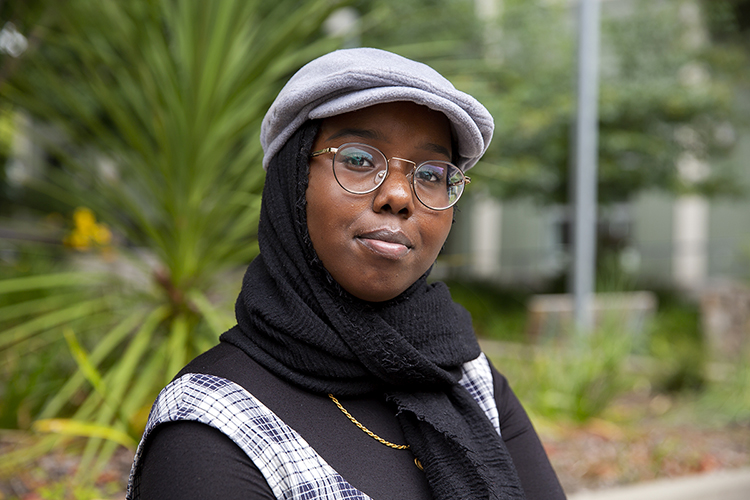
November 25, 2019
Also, listen to this Fiat Vox podcast episode about Dahir:
Saida Dahir grew up in Salt Lake City, Utah. At first, she thought she was like everyone else. But by sixth grade, she realized she was different. Her family was from Somalia — she was born in a refugee camp in Kenya after her family fled the civil war. The more she tried to fit in, the worse she felt. But in eighth grade, when she met Mr. Brandy, a journalism and English teacher, she began to realize her own power and started writing poetry. By her senior year, she was performing her poetry at protests and rallies across the country, proudly commenting on the injustices she saw all around her.
Read a transcript of Fiat Vox episode #60: “Fighting injustice with poetry”:
Narration: In 2006, sitting in a classroom of first-graders in Salt Lake City, Utah, Saida Dahir, now a first-year student at UC Berkeley, didn’t know she was different.
Saida Dahir: I think my childhood was very sheltered. A lot of the world looked the same to me every single day. All my teachers looked the same. Everyone in my classes looked the same. I make a joke that I just thought I was one of the white students in the class because it was very homogeneous.
[Music: “Throughput” by Blue Dot Sessions]
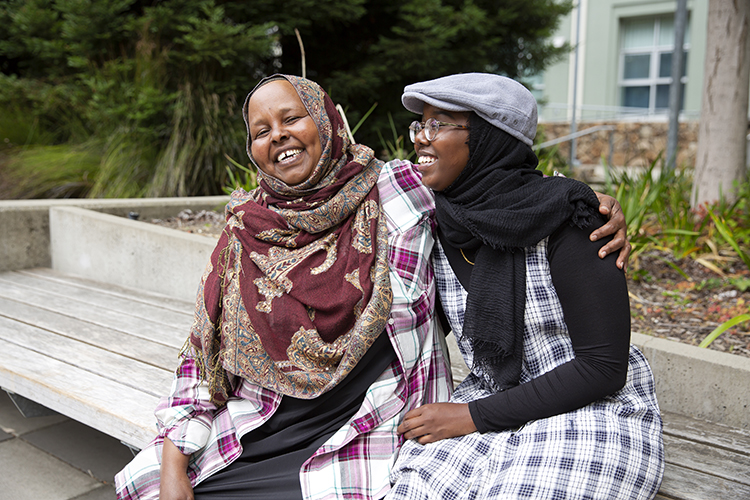
Saida Dahir with her mother, Fadumo Hassan, during move-in day at Berkeley. (UC Berkeley photo by Brittany Hosea-Small)
Narration: Saida’s family was from Somalia. She was born in a refugee camp in Kenya after her family fled the civil war. They immigrated to the United States when Saida was 3, so she doesn’t remember anything of her life back then. Life in Salt Lake City was the only one she’d known.
Saida Dahir: But then, when I started becoming a young girl, I just knew that I wanted to be normal and fit in. So, I really thought I was just one of them. And when I graduated from sixth grade, I realized … I’m different.
Narration: Throughout elementary school, she knew she didn’t like how she was treated by some people. She knew it didn’t feel right. But she didn’t have a name for it back then.
Saida Dahir: I remember, one day, I was walking out of the classroom in third or fourth grade, and these kids wrapped jackets around themselves and they saw me and jumped on the ground and were like, “Allahu Akbar!”
Narration: It means “Allah is the greatest” in Arabic.
Saida Dahir: And these were just 10-year-olds. And I was 10. I just looked at them and laughed because I didn’t really know what was going on.
And then, in fifth grade, we had a lesson about 9/11, and I was like, “Oh, that’s why.” It was a lot of like, “Aha! That’s racism” all my life. You become more aware because you have to become aware.
Narration: This is Fiat Vox, a Berkeley News podcast. I’m Anne Brice.
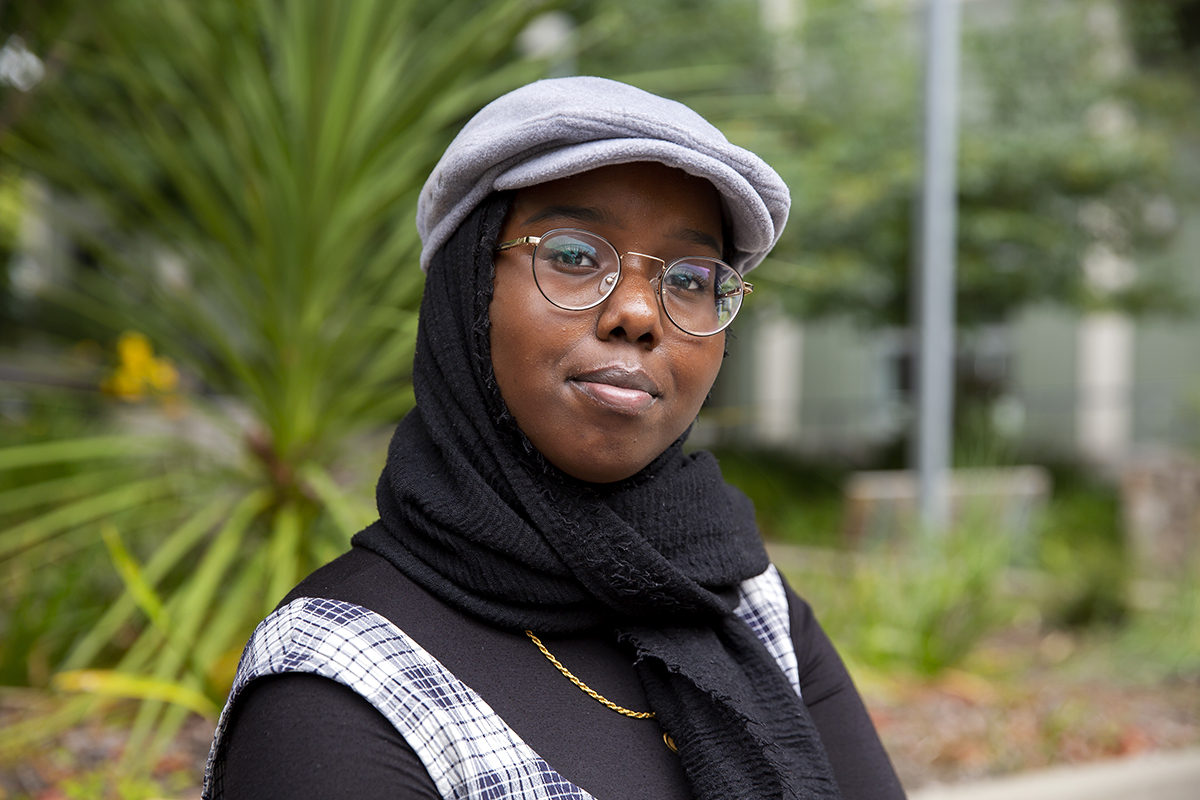
When Saida was in seventh grade, she decided she wanted to start wearing a hijab, like her mom and older sister. At first, she felt exposed and tried even harder to fit in. But in eighth grade, she met Mr. Brady, a journalism and English teacher, and everything changed. (UC Berkeley photo by Brittany Hosea-Small)
When Saida started middle school in seventh grade, she decided she wanted to wear a hijab, like her mom and older sister.
Saida Dahir: I always wanted to wear a hijab because it’s part of my religion and culture. Everyone in my family wore it. It was just there. I saw my mom and my sister, people I looked up to, and they wore it. So, I was like, “I guess I’ll wear it, too.” I also wanted to get closer to my relationship with God, and so many other reasons.
Narration: Although her new school was more diverse than her other one, she felt even more exposed wearing a hijab.
Saida Dahir: I just noticed the looks and different attitudes. I tried even more to be likable because before, I was just Saida. When I put the hijab on, I was a Muslim. You know, I portrayed everyone. So, I just tried my best to not be “that Muslim” or “that loud black girl.” I just did even more to make myself go into the background than I was before. It hurt a lot. It took a toll.
Narration: But in eighth grade, everything changed.
[Music: “Vienna Beat” by Blue Dot Sessions]
Saida had her first black teacher. His name was Michael Brandy. He taught journalism and English. Mr. Brandy helped her realize that she was powerful and special.
Saida Dahir: He was the one who was like, “No, you’re great.” And I was like, “Maybe I am great.”
Narration: Saida learned about who she was and where she came from. She read books written by black and international authors, like Toni Morrison and James Baldwin. She learned about Somali history and poetry.
Every day, Saida would eat lunch in Mr. Brandy’s classroom, where they’d talk about what was happening in the news. It was here, she says, where she learned what it meant to be black in the U.S.
[Sound clip: CBS news report about the murder of Trayvon Martin: “There are major developments tonight in the case of a neighborhood watch captain in Florida who shot and killed an unarmed 17-year-old. The U.S. Justice Department has now opened a civil rights investigation and the local prosecutor has now convened a grand jury to consider criminal charges. Justice correspondent Bob Orr has the latest.”]
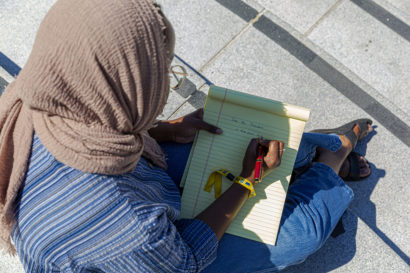
Although Dahir has written poetry since she was a child, she got serious about it in eighth grade. By her senior year of high school, she was performing at rallies and protests across the country. (UC Berkeley photo by Stephen McNally)
Saida Dahir: I remember Trayvon Martin happened, and his hearing was in a couple days. I was like, “I think that they’ll win.” And he looked me straight in the eyes and said, “They’re not going to win. You’re black, and this is America.” It was like, “Wake up, we’re not winning.”
It hurt. It really did. I was like, “Why the pessimism? We could win.” I was fighting with him, I was like, “No, I think we’re going to win this.” Then, that night, the hearing happened, and I came back into the next day and was like, “We lost. He’s free.” And then, Mike Brown happened. He was just there for all of that. And then, I became way more conscious.
Narration: Saida started writing poetry. She’d been writing poems and songs since she was a kid, but this was different. She felt like she’d woken up — that she was starting to understand herself and the world on a deeper level — and she wanted to express it.
[Music: “Secret Pocketbook” by Blue Dot Sessions]
In ninth grade, Mr. Brandy encouraged Saida to enter the school’s talent show.
Saida Dahir: I didn’t want to do it. I had never spoken my poetry to anybody.
Narration: But eventually, she decided to go for it.
It was in 2015, when Donald Trump was running for president. She wrote a poem called “Paper and a Pen” about a proposal Trump made, which would later become an executive order in 2017, that placed stringent restrictions on travel to the U.S. for citizens from seven countries, most of which have populations that are predominantly Muslim: Iran, Iraq, Libya, Somalia, Sudan, Syria and Yemen. It’s known as the travel ban, or Muslim ban.
[Sound clip: Excerpt from “Paper and a Pen” from a UC Berkeley video by Stephen McNally (above): “Dear Mr. President, in those seven countries, children can’t even go to school. And here, we have the audacity to sit in class and drool. So many children wish for an education with no limitation, but they live in a nation where little boys learn about war way before they learn their ABCs. While their families are thirsty and dying of disease. And when those bombs hit, there’s nowhere left to flee …” (fade out)
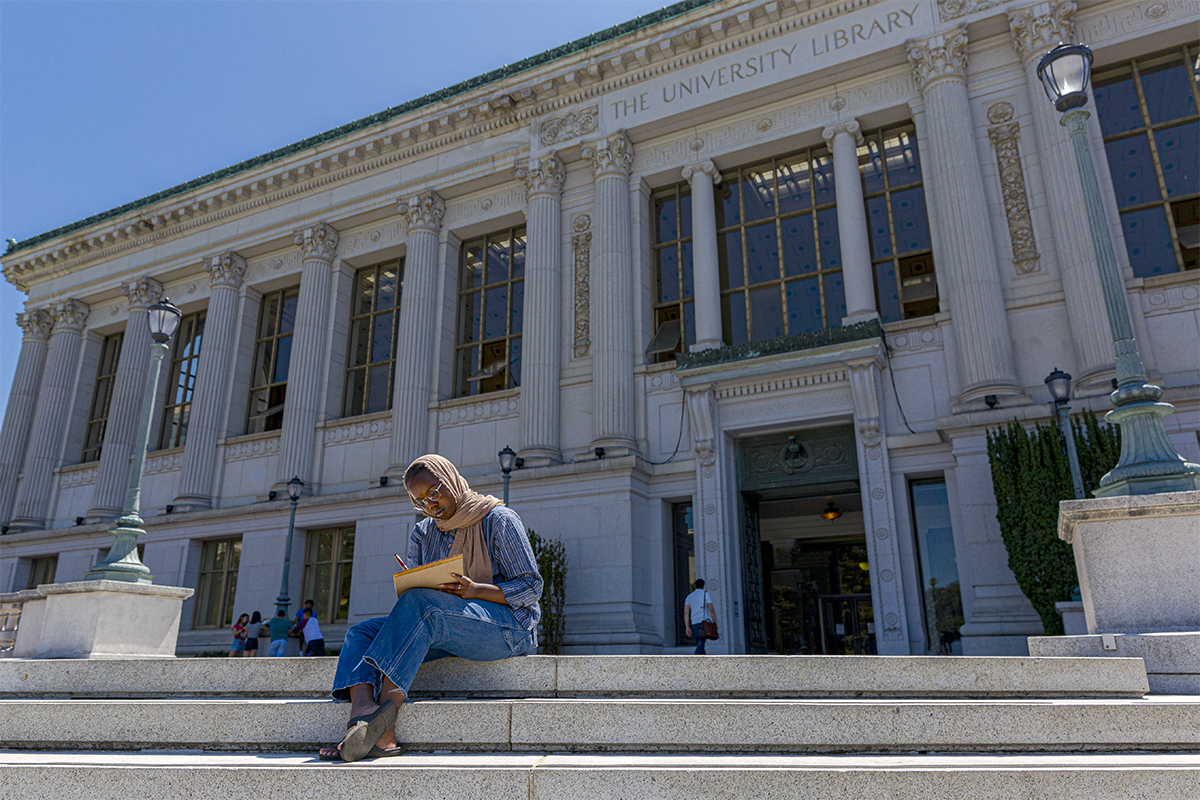
“There is a lot that we take for granted here in the United States,” says Dahir. “I’m so blessed. But I know that other people don’t have it, and I know there are flaws in what I am blessed to have. So, I’m also standing up for that. So, it’s me being very grateful, but also using my platform to be like, “No, that’s not OK.”(UC Berkeley photo by Stephen McNally)
Narration: By her senior year of high school, Saida was writing and performing her poetry all over the country. She spoke about issues like police brutality and gun violence at dozens of protests and rallies — the Refugee March, March for our Lives, Black Lives Matter.
[Sound clip: Saida performing at a March for our Lives rally in Salt Lake City: “Got the news the other day, praying it wasn’t ISIS-related, and watch more of my people radicalized and debated. If all Muslims are terrorists, what about this white boy?” (cheering)
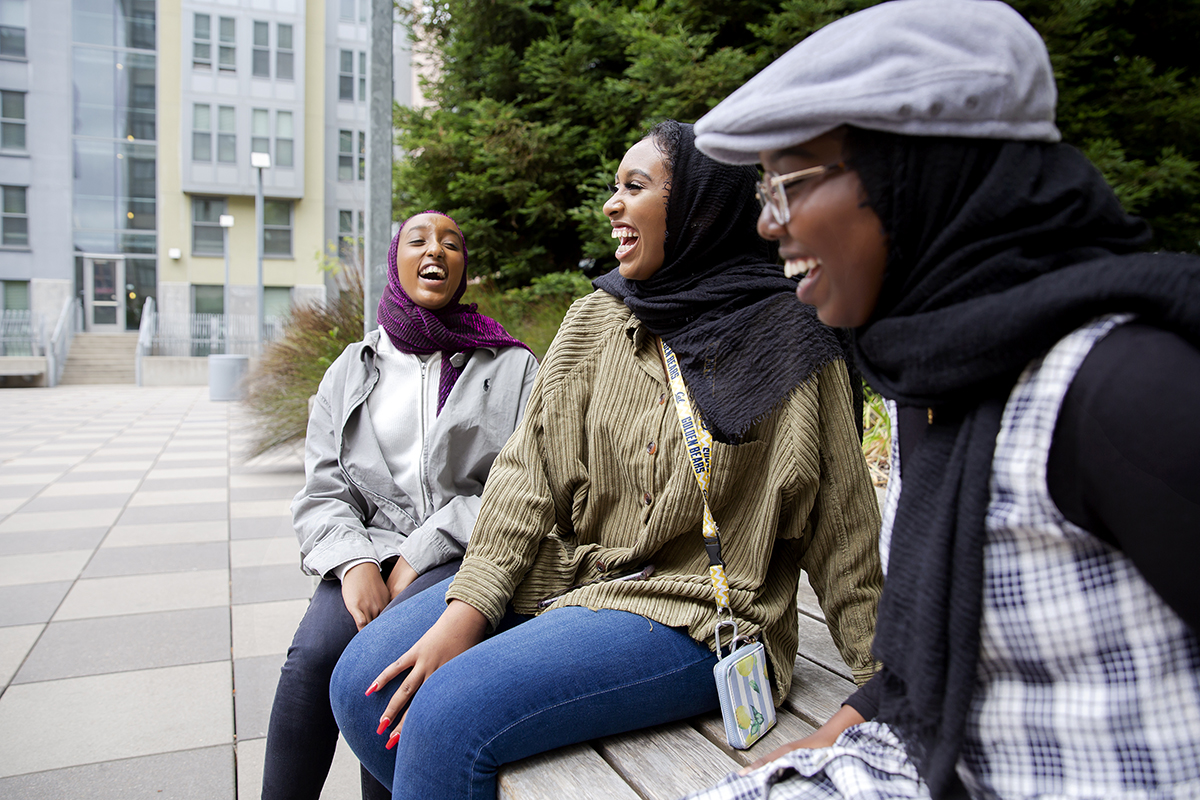
Dahir (right) with her roommates, Suaad Nour (left) and Farhiya Ali, both Somali American students. (UC Berkeley photo by Brittany Hosea-Small)
Saida Dahir: There is a lot that we take for granted here in the United States. I’m so blessed. But I know that other people don’t have it, and I know there are flaws in what I am blessed to have. So, I’m also standing up for that. So, it’s me being very grateful, but also using my platform to be like, “No, that’s not OK.”
[Music: “All American Canal” by Blue Dot Sessions]
Narration: In 2019, just days before Saida started at UC Berkeley, she released her first album of poetry, The Walking Stereotype, through the Little Village Foundation, a nonprofit record label that releases recordings by California’s leading underground artists. It includes seven poems that she wrote between the ages of 12 and 18. Each poem is accompanied by musicians.
Saida Dahir: It’s six years of my life. I just lay my heart into it, and I really love it.
Narration: At Berkeley, Saida plans to major in media studies — something that she grew to love during Mr. Brandy’s eighth grade journalism class.
And although she’ll continue fighting for what’s right, she says she needs a break from her intense activist schedule to focus on her education.
For Berkeley News, I’m Anne Brice.
Outtro: You can subscribe to this podcast, Fiat Vox, spelled F-I-A-T V-O-X, on Apple Podcasts or wherever you listen. If you liked this episode, consider sharing it with a friend. And check out our other podcast, Berkeley Talks, that features lectures and conversations at UC Berkeley. You can find all of our podcast episodes on Berkeley News at news.berkeley.edu/podcasts.